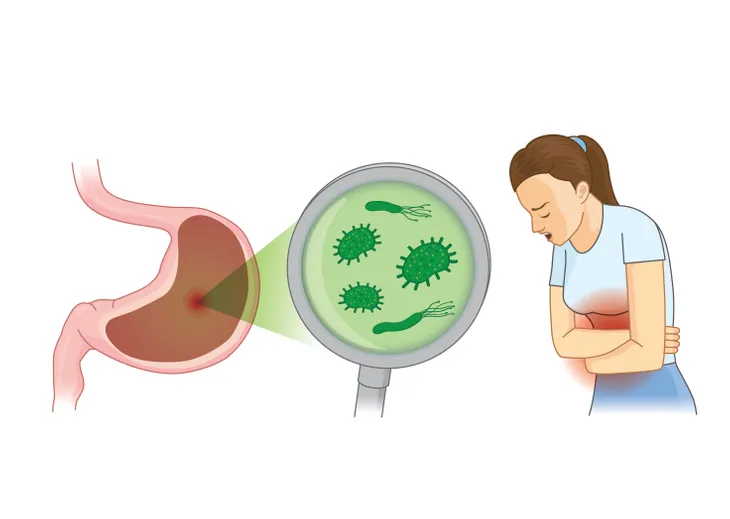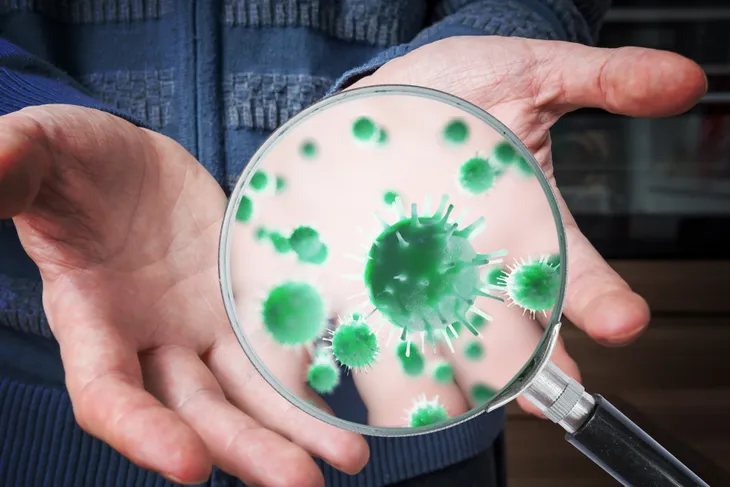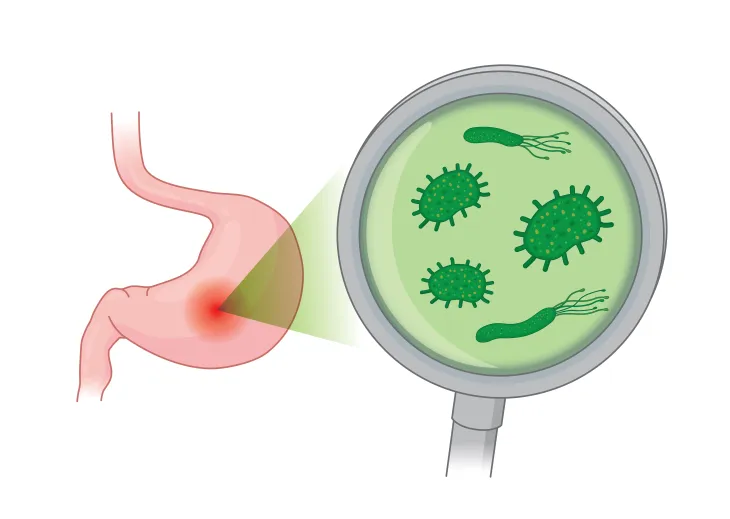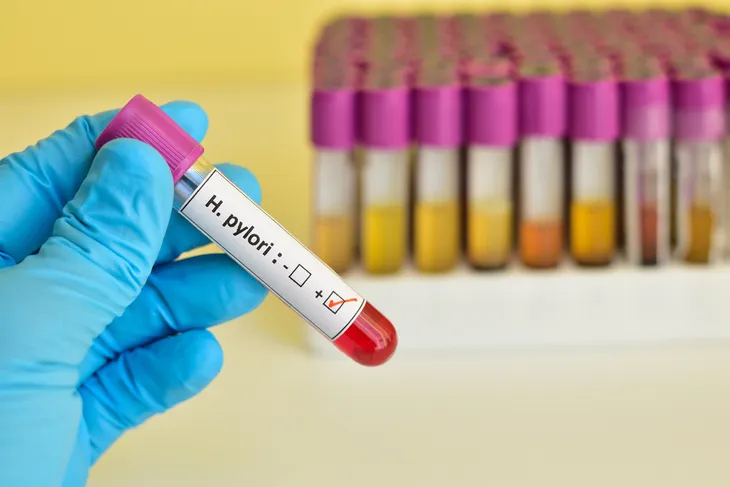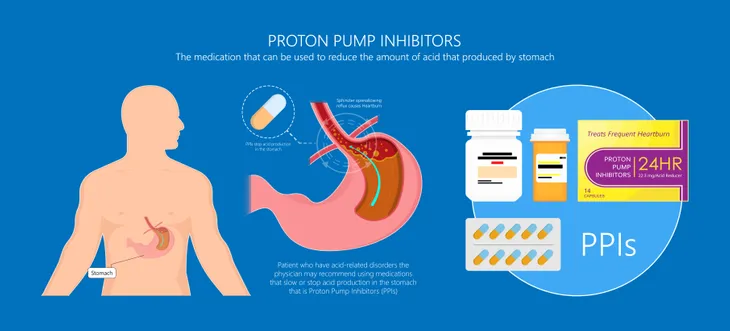H. pylori stands for Helicobacter pylori, and it’s a spiral-shaped bacteria that grows in the digestive tract and can live in the lining of your stomach. For most people, they become infected during childhood and will live their life with minimal to no symptoms. But for others, an H. pylori infection can cause serious issues, such as stomach ulcers and more.
For how common this bacterial infection is, many people have never even heard of it. In this easy to understand article, we’ll talk all about H. pylori, including how you can get infected, what an infection can mean for you, and so much more. So take a seat and let’s get started.
All About H. Pylori
H. pylori was discovered in 1982 and infects approximately two-thirds of the world’s population says the Centers for Disease Control and Prevention (CDC). It’s more common in African Americans, Hispanics, older adults, and people of lower socioeconomic status, writes the source. According to the CDC, the infection can cause gastritis, stomach ulcers, and gastric cancer. The source continues to report that, “infected persons have a 2- to 6-fold increased risk of developing gastric cancer and mucosa-associated lymphoid type (MALT) lymphoma compared with their uninfected counterparts.”
The bacteria are able to not only survive, but also thrive in the unwelcoming stomach environment. “[They] change the environment around them and reduce its acidity so they can survive,” says Healthline. Their spiral shape makes it easy for them to push through the stomach lining, where they are protected by the mucus from the body’s immune system cells.
How H. Pylori Spreads
Experts are not entirely sure how H. pylori is spread among people. They believe that it is spread from mouth to mouth. It may also spread from feces to the mouth, reports the CDC. This type of spreading can happen when someone doesn’t wash their hands properly after using the bathroom and then touches food or other surfaces.
To prevent the spread of H. pylori, make sure you wash your hands before you eat and after you use the washroom. You should clean your fresh produce before eating and only drink clean water. You may not be able to completely avoid an H. pylori infection, but by taking simple precautions, you will greatly decrease your chances.
H. Pylori Symptoms
One of the many problems with H. pylori is that its symptoms range from nonexistent to severe. You can be infected, not even know it, and spread the infection to others. For those that do have symptoms, they may include pain in the upper stomach area. This pain is often described as burning and worsens at nighttime or when the sufferer has an empty stomach, says Medical News Today.
Some of the other symptoms can be related to other ailments this bacteria causes, such as gastritis and even cancer. Talk to your doctor if you experience stomach pain and swelling, nausea, loss of appetite, indigestion, or vomiting, reports Medical News Today. These are all tell-tale signs that you may have an H. pylori infection that is causing serious issues to your body.
Risk Factors for H. Pylori Infection
Your risk factors for developing a H. pylori infection will depend upon where you live, your age, and other factors. Children are at higher risk for becoming infected, likely because of their poor hand hygiene, says Healthline. Another huge risk factor is poor living conditions, such as overcrowding, no access to hot water, and living with others who have H. pylori.
For many years, healthcare professionals thought that peptic ulcers were caused by eating spicy foods and stress. It turns out 10-percent of people with H. pylori will develop a peptic ulcer, says Healthline. The source also states that “long-term use of non-steroidal anti-inflammatory drugs (NSAIDs) also increases your risk of getting a peptic ulcer.”
Diagnosing H. Pylori
If you suspect that you have an H. pylori infection, it’s time to talk to your doctor to get diagnosed. There are a few diagnostic tests your doctor may use to determine if you have the bacterial infection. To begin, your doctor will likely ask you some questions to learn more about your health history and perform a physical exam. They may look for bloating, tenderness, or abdominal pain.
Once your doctor has gone over the basic exam he or she will decide if further testing is necessary. This can include a blood test to look for antibodies against H. pylori, stool testing, breath test, or even an endoscopy. You and your doctor will talk about the benefits and risks of each test and determine what route is best for your situation.
Treating H. Pylori
If your H. pylori infection isn’t causing any issues, you are not at risk for stomach cancer and your doctor may not treat it says Healthline. However, if you are experiencing symptoms, there are multiple treatment options to get rid of this nasty bacteria. The mainstay of treatment is antibiotics and a medication that lowers the stomach acid levels.
Adding a proton pump inhibitor (PPI) makes it easier for the antibiotic to work, says the source. After your treatment is complete, you will likely be retested for H. pylori to confirm the antibiotic and PPI combination did rid your body of the bacteria. Before you begin treatment, let your doctor know if you have any allergies, especially medication allergies.
Complications Caused by H. Pylori
The main complication of H. pylori is peptic ulcers. These painful erosions in the stomach lining are no walk in the park, but they pale in comparison to the other complications H. pylori can cause. Healthline tells us a peptic ulcer can cause internal bleeding if the ulcer erodes into a blood vessel, or the ulcer can create a perforation in the stomach wall. Another complication Healthline reports is “peritonitis, which is an infection of the peritoneum, or the lining of the abdominal cavity.”
Probably the scariest complication that is caused by H. pylori is stomach cancer. The CDC reports that gastric cancer is the second most common cancer in the world. While it’s a very real concern Healthline does reassure people that “while the infection is a major cause of stomach cancer, most people infected with H. pylori never develop stomach cancer.”
Preventing H. Pylori
Preventing H. pylori is difficult, since experts aren’t exactly sure how the bacteria is transferred from human to human. However, they do believe that general healthy habits can curb the transmission of the bacteria and prevent an infection. John Hopkins Medicine tells us the best way to prevent H. pylori is to wash your hands before you eat and after you use the bathroom. Another great way is to clean your food and ensure it has been cooked appropriately.
If you know someone who has a H. pylori infection, avoid kissing and sharing eating utensils. Also, only drink water that is clean and known to be safe from bacteria. While you may not be able to completely prevent a H. pylori infection, following these suggestions should greatly decrease the likelihood of catching it.
Living with H. Pylori
If you have been diagnosed with a H. pylori infection your outlook is good. Treatment is very successful and your doctor will recheck after treatment to ensure everything worked as it should. If you have developed a condition because of a H. pylori infection your future will depend upon the severity of the condition and how quickly it was treated.
For most people, H. pylori poses very few problems. When the bacteria does start to cause issues, such as peptic ulcers, then treatment is warranted and generally works after one round of medication. If you have a history of stomach cancer, your doctor may recommend H. pylori testing and treatment if you have a positive diagnosis.

